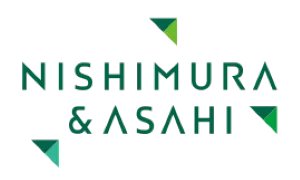AMENDMENTS TO JAPAN'S FOREIGN DIRECT INVESTMENT LAW—HEIGHTENED REVIEW OF INBOUND INVESTMENTS
From June 7, 2020, overseas investors may no longer be able to purchase shares of certain Japanese companies. The Japanese government passed amendments to its foreign direct investment laws that lower the government approval threshold from 10% to a mere 1% for share acquisitions of publicly traded companies that engage in a broad range of business activities deemed critical to national security, public safety, public infrastructure, or Japan's economy (the "FDI Amendments"). The Japanese government claimed that its foreign direct investment laws required a major overhaul because it lacked legislation to effectively screen foreign direct investment to the same recent extent as other developed countries. In particular, Japan's Ministry of Finance noted the 2018 passage of the Foreign Investment Risk Review Modernization Act in the United States and European Union regulations adopted in 2019 establishing a framework for monitoring foreign direct investments as examples of how Japan's foreign direct investment regime lagged behind international standards. As a result, practically every share acquisition by an overseas investor of a publicly traded company now deemed critical to Japan will require government approval, unless an exemption applies.
This edition of the Corporate Counselor outlines the broad reach of the FDI Amendments and the exemptions that curtail its application, and then proceeds to highlight issues that prospective overseas investors should consider through a question and answer format. Given the complexity of the FDI Amendments, decision tree diagrams are included in annexes to provide a visual flow of how the FDI Amendments apply to a transaction.
Prior Foreign Investment Review Regime
The principal statute regulating foreign direct investment into Japan is the Foreign Exchange and Foreign Trade Act (the "FDI Act"). Prior to the FDI Amendments, generally speaking when an overseas investor acquired (either directly or along with its affiliates) any shares of a Japanese privately owned company or 10% or more of the outstanding voting rights in a Japanese publicly traded company, then after the closing the investor was required to file a post-acquisition notice report with Japan's Ministry of Finance and the Japanese economic ministry overseeing the industry in which the target company operates (which report provided notice of the closing of the transaction and did not require the Japanese government to consent to the purchase). However, an overseas investor was required to obtain Japanese government approval prior to the closing for its share purchase if the public or privately owned target company or any of its subsidiaries engaged in a business that the Japanese government deemed critical to Japan's national security (which was a finite list primarily limited to weapons, aircraft, and nuclear power) or engaged in certain protected industries (another finite list primarily limited to agriculture, petroleum, and leather).
To date, only one proposed foreign investment has been blocked pursuant to the rubric of the FDI Act – the proposed acquisition in 2008 by the Children's Investment Fund (a British hedge fund) to increase its holdings in J-Power, a Japanese electric wholesale company, from 9.9% to more than 20%. Japan's Ministry of Economy, Trade and Industry objected to the ownership increase based on the argument that the purpose of the Children's Investment Fund was to maximize profits, which was incompatible with J-Power's function as an energy provider to Japan.
Amended Foreign Investment Review Regime
Effective May 8, 2020 (but applying to purchase transactions only after the expiration of a 30-day grace period), a "Foreign Investor" (as explained below under "Key Defined Terms") is required to obtain a Japanese government approval to acquire as low as 1% of the outstanding voting rights or the issued shares in a publicly traded "Designated Company" (as explained below under "Key Defined Terms"), unless a newly established exemption applies (as explained below under "Share Purchase Exemptions"). By changing the approval threshold from 10% to a mere 1%, the FDI Amendments will require a Foreign Investor to comparatively submit more filings to the Japanese government to acquire equity of a Designated Company. The FDI Amendments also modify the post-acquisition notice reporting requirements for certain purchases of a publicly owned Designated Company. The FDI Amendments do not alter the notice and approval thresholds in connection with the purchase by a Foreign Investor of shares of a privately owned Designated Company, which remain the same at one share or more, unless a newly established exemption applies that eliminates the need for Japanese government approval for the purchase (as explained below under "Share Purchase Exemptions—Regular Exemption").
The FDI Amendments also require a Foreign Investor to obtain Japanese government approval post-acquisition if it desires to (i) appoint directors and statutory auditors to the Designated Company, or (ii) propose to transfer or dispose of a "Designated Business Sector." Accordingly, the FDI Amendments require Foreign Investors not only to obtain Japanese government clearance for acquisitions, but also for exercising shareholder rights. The contours of obtaining Japanese government approval for the post-acquisition exercise of such shareholders rights is not covered by this newsletter and will be addressed in a subsequent edition of the Corporate Counselor.
Key Defined Terms
As the need to obtain Japanese government approval for an inbound investment will partly depend on the type of investor and the business activities engaged in by the Japanese target company, it is essential to understand the following key terms under the FDI Amendments:
- "Designated Company" means an entity engaged in any Designated Business Sector, including a Core Sector.
- "Designated Business Sector" means any of the general business activities listed under this caption in Annex I.
- "Core Sector" is a subset of a Designated Business Sector as listed under this caption in Annex I and are activities for which the Japanese government considers of great significance to national security (so subject to higher government scrutiny). A company engaged in a Core Sector always will be considered to engage in a Designated Business Sector too, but not always vice versa.
- "Foreign Investor" means an individual or entity that is a non-resident of Japan, and a Japanese organized company for which 50% or more of the voting rights are directly or indirectly owned or controlled by a non-resident of Japan.
Business Activities Captured by the FDI Amendments. Deal practitioners may find it difficult to independently determine if a target Designated Company is engaged in a Designated Business Sector or Core Sector given the expansive definitions of these terms. To reduce ambiguity, all Japanese publicly traded companies have been given a rebuttable classification as to whether (i) an investment in such entity is subject only to a post-acquisition notice report, (ii) the entity conducts business in a Designated Business Sector (but not a Core Sector), or (iii) the entity conducts business in a Core Sector. The assigned classification is not conclusive, so if a company is misclassified and actually engages in a Designated Business Sector, then the Japanese government may request the Foreign Investor to undertake remedial measures (so due diligence with the assistance of management over the target company's business operations remains critical). Japanese privately owned companies do not receive similar public classifications, so an acquirer is required to ascertain business status through due diligence (also with the assistance of the target company's management as it should know whether its goods and services are subject to government controls due to prior communications with local regulators).
Deal practitioners should note that a company's designation is subject to change as its business activities evolve and depending on the developing national security concerns of the Japanese government. For example, the Japanese government announced that as of July 15, 2020 companies operating in the fields of vaccines (including applicable raw materials, serums and formulation), medicines that treat and prevent infectious diseases, and advanced medical equipment that is difficult to manufacture or for which few alternatives would be available when an infectious disease spreads globally (such as ventilators, infusion pumps and artificial dialyzers) will be classified as a Core Sector under a new Designated Business Sector "Infectious Disease Medicines and Specially Controlled Medical Devices." The new designation is clearly in response to the COVID-19 pandemic.
To view the full article please click here.
Originally published in The Corporate Counselor – June 2020
The content of this article is intended to provide a general guide to the subject matter. Specialist advice should be sought about your specific circumstances.


